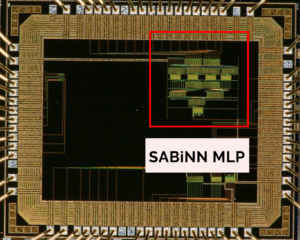Integrated Circuit Design
LPiNS research laboratory specializes in the development of energy-efficient microchips. We focus on biomedical applications, harnessing the power of low-power integrated circuits to revolutionize healthcare technology. Our research targets advancements in medical devices, wearables, and diagnostic tools, making them more reliable, portable, and long-lasting. By incorporating low-power design methods in integrated circuit design, we aim to improve patient care, reduce power consumption, and create a healthier, more connected world through transformative technological solutions.
Research Topics
Wearable Sleep Apnea Detection Device for Adults
The manual scoring of the apneic events from the Polysomnography (PSG) data is very time-consuming which also demands specially trained sleep experts. Thus, it necessitates the importance of the design and development of a compact and wearable apnea detection device that alleviates these problems by also utilizing AI/machine learning algorithms that can automatically detect apneic events from the data collected by the sensors. The key research aims in this project are (1) developing an energy-efficient SA detection model that can be inferred on hardware, (2) using minimal biosensor technology for comfort and increased accuracy and (3) utilizing CMOS technology to ensure portability and compact design architecture.

Wearable Sleep and Respiratory Monitoring Device for Infants
Developing a compact, non-invasive biomedical system will pave the way for smart wearable biomedical devices designed for critical patients. The implementation of high accuracy automatic detection scheme will not only eliminate time-consuming data acquisition process examined by medical experts but also reduce the labor-intensive long hour workload for the caregivers on duty in NICUs. In this research project we have developed a smart monitoring system for infants which takes in vital signals from the patients such as PVDF sensor based nasal cannula monitoring breathing pattern, red-LED monitoring pulse oximeter and giving automatic diagnostic results through a real-time smart-chip.

SABiNN on 130nm CMOS Process
A shift accumulator based binarized neural network (SABiNN) was developed on 130nm CMOS process provided by Google+Skywater. The proposed optimized Deep Neural Network (DNN) model was designed for biomedical applications monitoring sleep apnea among adults. The SABiNN model was successfully inferred on the chip and resulted in a significant reduction in power consumption rate. Compared to the baseline model of DNN, SABiNN reduced the power consumption 10x times by replacing multipliers with shifters and constraining the weight and bias values of the network within “0” and “+1”. The future of this project is to implement SABiNN on larger network architectures and be utilized in the development of biomedical instrumentation.
The SABiNN verilog model can be found: github
